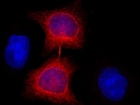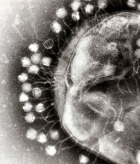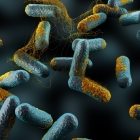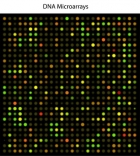What is new in Biotech
Reprogrammed T cells make mice (and maybe us) age slower
26.1.2024 | Press monitoring
Researchers have used reprogrammed CAR T cells, usually used as a cancer treatment, to target the senescent cells that contribute to aging and later-life diseases. After one treatment, old mice showed improved metabolism and exercise tolerance, while young ones aged slower and were protected from age-related diseases like obesity and diabetes for...
Bar-coding bacteriophages: New method could unleash powerful biotechnology applications
24.1.2024 | Press monitoring
Barcodes at the supermarket allow fast and easy product identification, often including such valuable information as location, quantity, and tracking. Now, a rapid gene labeling or characterization scheme for bacteria-infecting viruses known as bacteriophages, or phages, has been developed for similar purposes by researchers at the Department of...
Allergy-specific nanoparticles target immune cells, prevent anaphylaxis
22.1.2024 | Press monitoring
Allergies can range in severity from itchy eyes and a runny nose to life-threatening anaphylaxis. Peanuts, dust, mold, dog hair, perfume, pollen, drugs, insect stings, and latex – besides avoiding these things entirely, for some people there’s no way to prevent allergic reactions. That may soon change, thanks to researchers at Northwestern...
A single dose of urea-powered nanorobots reduces bladder tumors by 90% in mouse study
19.1.2024 | Press monitoring
Bladder cancer has one of the highest incidence rates in the world and ranks as the fourth most common tumor in men. Despite its relatively low mortality rate, nearly half of bladder tumors resurface within 5 years, requiring ongoing patient monitoring. Frequent hospital visits and the need for repeat treatments contribute to making this type of...
Meet pAblo·pCasso: A new leap in CRISPR technologies for next-gen genome engineering
17.1.2024 | Press monitoring
A new CRISPR-Cas toolkit, dubbed "pAblo·pCasso," is set to transform the landscape of bacterial genome editing, offering unprecedented precision and flexibility in genetic engineering. The new technology, developed by researchers at The Novo Nordisk Foundation Center for Biosustainability (DTU Biosustain), expands the range of genome sites...
New fuel cell harvests energy from microbes in soil to power sensors, communications
15.1.2024 | Press monitoring
A Northwestern University-led team of researchers has developed a new fuel cell that harvests energy from microbes living in dirt. About the size of a standard paperback book, the completely soil-powered technology could fuel underground sensors used in precision agriculture and green infrastructure. This potentially could offer a sustainable,...
More than 30 new species of bacteria discovered in patient samples
12.1.2024 | Press monitoring
Unknown germs are a common occurrence in hospitals. Researchers at the University of Basel have spent many years collecting and analyzing them. They have identified many new species of bacteria, some of which are significant for clinical practice. Bacterial infections can be treated more efficiently if the cause of the disease is known. In most...
Researchers engineer in vivo delivery system for prime editing, partially restoring vision in mice
10.1.2024 | Press monitoring
Prime editing, a versatile form of gene editing that can correct most known disease-causing genetic mutations, now has a new vehicle to deliver its machinery into cells in living animals. A team of researchers at the Broad Institute of MIT and Harvard has engineered virus-like particles to deliver prime editors to cells in mice at a high enough...
In a breakthrough, diabetics damaged cells regenerated to produce insulin
8.1.2024 | Press monitoring
For many years, research has focused on identifying novel therapies that stimulate beta-cell growth and function to restore insulin production in type 1 diabetics. Now, in an exciting breakthrough, researchers at the Baker Heart and Diabetes Institute in Melbourne, Australia, have brought us a step closer to making this a reality, regenerating...
Inhalable sensors could enable early lung cancer detection
5.1.2024 | Press monitoring
Using a new technology developed at MIT, diagnosing lung cancer could become as easy as inhaling nanoparticle sensors and then taking a urine test that reveals whether a tumor is present. The new diagnostic is based on nanosensors that can be delivered by an inhaler or a nebulizer. If the sensors encounter cancer-linked proteins in the lungs,...































